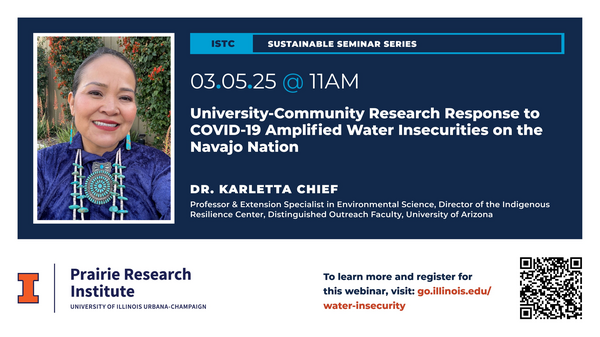
- Sponsor
- Illinois Sustainable Technology Center
- Speaker
- Karletta Chief - Professor & Extension Specialist in Environmental Science, Director of the Indigenous Resilience Center, Distinguished Outreach Faculty
- Registration
- Register via Zoom
- Contact
- Filza Armadita
- filza@illinois.edu
- Views
- 159
- Originating Calendar
- Illinois Sustainable Technology Center Events
Abstract: COVID-19 amplified water insecurities across the world and disproportionately impacted Indigenous communities. In the United States, COVID-19 is rampant on the Navajo Nation, the largest tribe in the United States where poverty rates (38%) are more than twice the state of Arizona (15%). Navajo tribal officials cite lack of healthy foods and running water as reasons for the prolific transmission resulting in one of the highest COVID-19 infection rates in the United States, third only to New York and New Jersey. Comorbidities such as diabetes and cancer are prevalent due to environmental exposure from abandoned mines. Furthermore, nearly 40% of remote Diné (Navajo) homes lack electricity and 30% lack running water. The Diné haul water from potable and non-potable sources 5-50 miles away incurring an enormous expense of $13.30 per 100 gallons. Community resilience is critical for Diné communities to respond to and recover from perturbations such as pandemics and disasters. This talk will focus on the university-community research response to address amplified water insecurities as a result of COVID-19 on the Navajo Nation stemming from a previous 3 year partnership with Diné College (the oldest tribal college in the U.S.) and a NSF Research Training Program called “Indigenous Food, Energy and Water Security and Sovereignty (Indige-FEWSS).”
Biography: Dr. Karletta Chief (Diné) is the director of the Indigenous Resilience Center, Distinguished Outreach Faculty, and Professor & Extension Specialist in Environmental Science at the University of Arizona. She oversees the NSF Indigenous Food, Energy, and Water Security and Sovereignty Training Program. Dr. Chief received a B.S. and M.S. in Civil and Environmental Engineering from Stanford University in 1998 and 2000 and a Ph.D. in Hydrology and Water Resources from UArizona in 2007.
This webinar is a certified green event by the University of Illinois' Institute for Sustainability, Energy, and Environment.